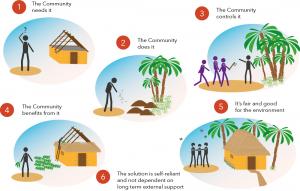You are here
- Home
- blog_categories
- Disputed Landscapes
- Community-Owned Solutions: Key to Sustainability - Andrea Berardi
Community-Owned Solutions: Key to Sustainability - Andrea Berardi
3 December 2015

The Cobra Collective, of which I am a member, seeks to empower marginalised communities by helping them to identify, record and promote community-owned solutions to social and environmental challenges around the world. Specifically, the team's role is to act as facilitators by providing support to identify successful solutions and creating the conditions for them to flourish. Our training, research and implementation work with community organisations, NGOs, international agencies and policymakers supports the enhancement of social justice and ecological sustainability.
Several members of the collective have worked in community development across the world for more than 20 years, and as a group we have expertise in community engagement, visual techniques and environmental management. Most recently we were involved in Project Cobra, an EU-funded 3½ year project based in Guyana, Brazil, Colombia, Venezuela, Suriname, and French Guiana which was successfully completed in February 2015.
What are Community-Owned Solutions?
Community-owned solutions are practices which have arisen in response to one – or more – challenges and contribute to the community’s well-being both in the present and the future. They are born, developed and successfully implemented within the community, by the community, and without major influence from external stakeholders. In general, they are characterised by:
- Local demand: they arise from community demand for economic, social, or environmental benefits, or as a reaction to the loss of these benefits.
- Local action: they are carried out by local people (although possibly with some support from government, civil society or private sector partners).
- Local management: planning, implementation and evaluation are organised locally.
- Local benefits: benefits occur primarily within the community – although this does not preclude additional regional, national, and global benefits.
- Ethics:
- they do not have a negative impact on the local or global environment, and where possible even enhance local and global biocapacity;
- financial benefits are distributed fairly;
- participation is from all sections of the community and there is no discrimination.
- Self-reliant: they are self-reliant and not dependent on long-term external support.
Why Do We Advocate Community-Owned Solutions?
Community-owned solutions offer a source of inspiration and practical action for both Indigenous and non-Indigenous communities to preserve multiple benefits. These benefits include – without being limited to – reduction of emissions, conservation of biodiversity and water resources, improved food security, regulation of regional climate and maintaining cultural heritage.
In addition, highly marginalised groups such as Indigenous peoples are generally represented as 'poor', 'backwards' and 'requiring help'. This deficit model all-too often prevails at every level of policy- and decision-making, meaning that government and market-led approaches to sustainable development are generally designed by external 'experts'. As a result, many policies propose generic, blueprint solutions that can undermine local solutions that already exist.
The Cobra Collective's work so far has shown that Indigenous peoples and other marginalised groups are a source of inspiration, and have multiple solutions for adapting to current and emerging challenges. However, the global community can only learn from these solutions when highly marginalised groups are adequately and authentically represented in all levels of decision-making.
Andrea Berardi is a lecturer in Environmental Systems in the OU’s Department of Engineering and Innovation. You can follow Andrea's research and campaigns on Facebook and Twitter. This post is adapted from one originally published on the Cobra Collective blog and we are grateful for their permission to reproduce it. Read original article.
Share this page:
Contact us
To find out more about our work, or to discuss a potential project, please contact:
International Development Research Office
Faculty of Arts and Social Sciences
The Open University
Walton Hall
Milton Keynes
MK7 6AA
United Kingdom
T: +44 (0)1908 858502
E: international-development-research@open.ac.uk
.jpg)